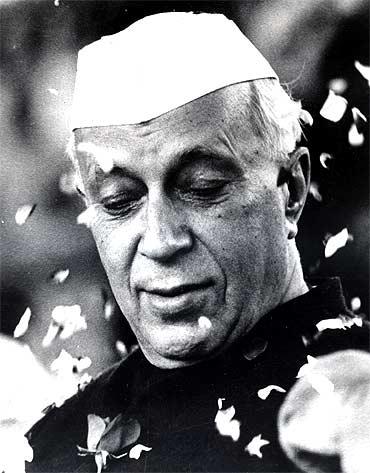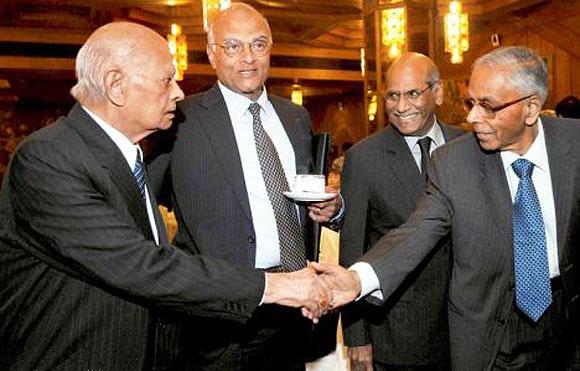
The country should not banish 'non-alignment' from its foreign-policy dictionary, says Shyam Saran
The publication of "Non-Alignment 2.0", which seeks to promote an informed debate on evolving a new consensus on India's foreign and security policies, has generated controversy. The authors stand accused of resurrecting the buried ghost of non-alignment, which allegedly served to limit rather than advance India's interests.
This is puzzling as no political dispensation in India, since the end of the Cold War, has discarded it. How do you stand guilty of resurrecting something that has not quite been pronounced dead by those who run India's foreign policy?
Non-alignment needs to be assessed objectively and without prejudice. The way Jawaharlal Nehru conceived it, non-alignment was a strategy and not a dogma. Its relevance as a principle of our foreign policy must also be distinguished from the fate of the Non-Aligned Movement, which was specific to a binary Cold-War construct that no longer exists.
There is more substance to the criticism that it has often been a convenient cover for not taking positions on key issues of the day, which all great powers must do. There is also a suggestion that non-alignment is reflexively anti-West and the use of this term may bring that attitude of mind back into the conduct of our foreign policy.
The phrase "non-aligned" was first used by the then Indian Ambassador to the United Nations V K Krishna Menon at the UN General Assembly in 1953 and by Pandit Nehru in 1956. However, the strategy that lay behind the phrase had been spelt out by Nehru much earlier, first in Constituent Assembly debates and later in Parliament. The very sense of India, with its history and civilisational attributes, he said, demands the pursuit of an independent foreign policy.
...

Decisions relating to India's vital interests should not be externally determined. Maintaining and, if possible, expanding the country's strategic autonomy is a continuing objective. Nehru did propose that India should avoid entering into "other people's quarrels", unless, and this is important, "our interest is involved".
He demonstrated a realistic awareness of the limits of India's ability to influence events when he added: "We should either be strong enough to produce some effect or we should not interfere at all". This is eminently sensible advice.
Nehru also did not rule out entering into an alliance if that proved necessary: "We are not going to join a war if we can help it: we are going to join the side which is to our interest when the time comes to make the choice."
The same pragmatism is evident in the following remarks: "Whatever policy you lay down, the act of conducting the foreign affairs of a country lies in finding out what is the most advantageous to the country."
We often face a dilemma about how India should vote on important resolutions at the United Nations. Consider the controversy over our abstention on the Security Council resolution on Libya and our more recent affirmative vote, along with the West and the Arab League, on Syria.
...

Nehru suggested criteria on which such decisions could be evaluated: "Our instructions to our delegates have always been to consider each question first in terms of India's interest, and secondly on its merits." This means that if the two criteria diverge, India's interest should prevail.
None of these elements of non-alignment can be described as irrelevant today even if in the actual conduct of our foreign policy, we have often been seen as unusually defensive and even negative. In the Cold War period, such defensiveness was a product of our own limited power.
Today, the essence and logic of non-alignment have not changed but they have to be applied in a vastly transformed international landscape and at a time when India itself is being transformed. India must continue to seek strategic autonomy but through a more contemporary reinterpretation and application of the principles of non-alignment. That is what "Non-Alignment 2.0" seeks to do.
So what are some of the features of the contemporary world that Indian foreign policy must address?
India's enhanced economic and security capabilities enable it to influence external events and outcomes in a widening orbit compared to the Cold War years. India enjoys greater leverage but bears greater responsibility in dealing with regional issues such as South Asian and East Asian economic integration and global issues such as climate change and energy security.
Furthermore, in a globalised world, external issues impact our economic and social development prospects while domestic choices we make as a country, in turn, have an impact on the external environment. Promotion of India's interests demands far greater engagement with the world than ever before.
...

Depending on the issue at hand, India will find itself working with shifting and variable coalitions rather than through settled alliances or groupings. The country has inherent assets, such as a favourable demography, a strategic location and a culture of creativity and innovation, which create a window of opportunity to drive India's emergence as a front-ranking power, a master of its own destiny but generating a range of public goods that make the world a better and safer place to live in.
It has been argued by some that we are on the threshold of a new and enduring confrontation between the US and China. Given the challenge that China's apparently relentless rise poses to India, the pursuit of a "non-aligned" policy appears unwise. The US has greater affinity and empathy with India.
It supports India's acquisition of economic and technological capabilities and has convergent concerns over Chinese hegemony. But the US has not yet determined whether, in its relative decline, its interests are better served by playing a balancing role in Asia among Asian powers including between China and India or seeking to contain China through a network of allies.
Neither precludes India and the US pursuing closer partnership and both seeking a more cautious and nuanced relationship with China.
It is possible that a change in circumstances and India's vital interests may demand that it gravitate towards alliance with the US and other major powers. As Nehru said, when the time comes to make a choice India will do so. It came close to doing this in 1971 when it concluded the Indo-Soviet treaty.
But as long as the prevailing regional and international situation remains fluid and uncertain, India would be wise to hedge its bets, engaging with all with different degrees of proximity, but allying with none.
The author is a former foreign secretary.